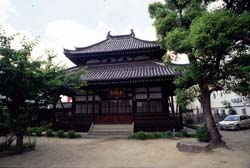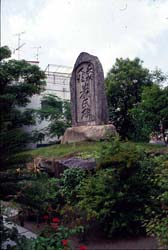|
|||
| 4-5, 1-chome, Higashimikuni, Yodogawa-ku, Daiganji Temple | |||
| [ Higashiyodogawa ] by JR about 200m to the north | |||
| It is said that the Emperor of Suiko (554-628)
built the Hashimoto Temple at the side of
the Nagarabashi to let Iwa rest in peace
who was dead at the human sacrifice of the
Nagarabashi. This is the origin of the Daiganji
temple. The cathedral of the temple was reconstructed
in the 6th year of Ansei (1859). The temple
has the image of Jizo, a picture of Iwa and
some remnants of the bridge as its treasure.
The Emperor of Goichijo (1008-1036) was deeply
impressed by the incident and made the image
of Jizo made of the old trees that had been used
as part of the Nagarabashi in
the 3rd year of Kannin (1019). There are some kinds of legend about the Nagarabashi human sacrifice. But according to the account of the origin of this temple, there was a rich man named Iwa living in the district of Tarumi of Suita. He always thanked God for his circumstances. He wanted to be of any service for those who suffered from the difficulties trying to construct the bridge, so he killed himself as a human sacrifice. |
|
 Daiganji temple  Nagara immolation monument (5-9, 2-chome, Higashimikuni) |
| to the top page of The Yodogawa Eguchi Course |